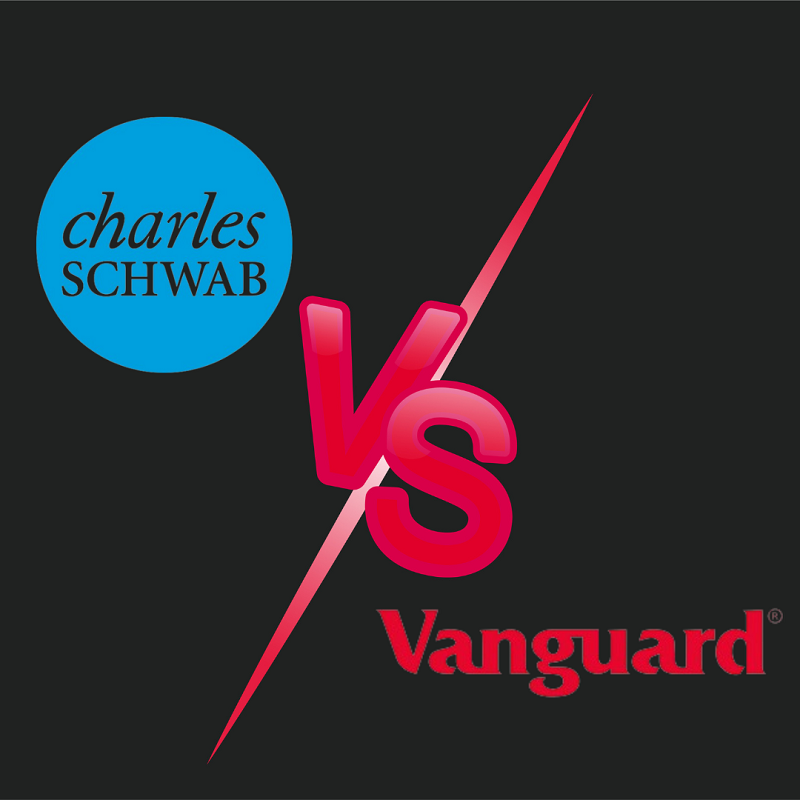Vanguard or Charles Schwab: which one is better?
May 10, 2024 By Triston Martin
Vanguard and Charles Schwab are the world's largest investment companies. Vanguard manages the assets of more than 50 million investors, which total $7.2 trillion. Charles Schwab has around $8.02 trillion in client assets, including 1.8 million banking accounts, 2.4 million retirement plan accounts, and 34.4 million active brokerage accounts.

The investment world is evolving. Vanguard and Charles Schwab are well-known for asset management. These companies also act as brokers, processing millions of trades for their clients. If you want to open a brokerage account, you can consider any of them.
What are the Similarities between Vanguard vs. Charles Schwab?
- Investment Options: Stocks, ETFs, Options Bonds, Mutual funds, 401(k)s, Money market funds, CDs, and IRAs
- Robo-Advisors: Each company offers premium and essential robo-advisor tools for automated investing.
- Basic Robo-Advisor: Vanguard Digital Advisor is the essential tool of Vanguard that allows users to invest in Vanguard ETFs. This digital advisor didn't cost any advisory fees initially. After three months, you have to pay 0.25% of the advisory fee for a mix of index and active options investment options; for all-index investment options, the advisory fee is 0.20%.
- Commissions: Vanguard does not charge commissions on online trades of Vanguard mutual funds, ETFs, and stocks. Similarly, Charles Schwab charges zero commission on options trades and no commission for online trades of US-listed stocks.
- Longevity: Charles Schwab is four years older than Vanguard and was founded in 1971.
- SIPC: Both Vanguard and Charles Schwab are Securities Protection Corporation members. These investment companies protect cash and securities in the client's brokerage account. The limit for SIPC insurance is $500,000 per customer (with $250,000 in cash)
- Premium Robo-Advisor: An automated tool that steps up the robo-advisiting game of Charles Schwab is "Schwab intelligent Portfolio Premium. It's an automated tool that can be used to invest in ETFs. Sign up for this premium product for $25,000 to get direct access to a financial expert. It's not a cheap service; the one-time cost of planning fees is $300, and a monthly advisory fee is $30. Vanguard offers Vanguard robo-advisor services to its wealthy customers. The yearly advisory fee for active & index buying options is 0.4%, with a minimum account balance of $50,000.
What are the key differences between Vanguard and Charles Schwab?
The critical differences between Charles Schwab and Vanguard lie in their fees, trading options, and customer service:
Charles Schwab | Vanguard | |
Account Fee | Schwab does not charge fees on IRAs or brokerage accounts. | Vanguard Charges an annual fee of $25 on mutual funds accounts and brokerage. It also charges fees for 401(K) and IRAs |
Fees (Options) | $0.65 per contract | $1 per contract |
Range of Offerings | More extensive (bonds, futures, forex, options) | More limited (focused on index funds and ETFs) |
Trading Experience | Advanced platforms and tools | Primary platform, geared towards buy-and-hold investors |
Future Trading | Permit future trading | Doesnt permit future trades |
Minimum Investment for Robo-Advisor | $5,000 | $3,000 |
Research Amenities | Comprehensive research tools and resources | Fundamental screeners and limited research tools |
Education | Extensive investor education resources | Focused on helping investors set and reach financial goals |
Customer Service | 24/7 phone and online chat support | Limited phone support hours, no live chat |
Security | Industry-standard security measures, excess SIPC insurance | Industry-standard security measures, unclear excess SIPC insurance |
Who should consider Charles Schwab?
Charles Schwab is a suitable option for self-directed and full-service investors. The company is well-known for its exceptional customer service. If you need in-person customer service, Schwab has 300 plus branches to offer the best support for its users.
In other words, Schwab isn't shining as much, like charging $5,000 to invest using a robo-advisor, and having limited access to fractional shares.
Pros and Cons of Charles Schwab
Pros | Cons |
Nationalwide branches to offer the best service | For robo-advisor high threshold investment |
No maintenance fees for Individual Retirement Accounts (IRA) or brokerage accounts | Limited fractional shares availability |
For brokerage accounts, there is no need for a minimum investment | For future trading you need to create a separate account |
There are no commissions for online trades of listed ETFs, stocks, and options |
Who should consider Vanguard?
Vanguard is known for its low-cost investing, which helps investors maximize their returns by paying a low fee. It's a client-owned company, which means clients can access their funds and have full control over them. You can select from a broad range of investment options, such as stocks, bonds, mutual funds, and ETFs.
Vanguard also has some downsides, like it doesn't operate branches. It also doesn't offer future trading, and for brokerage accounts and IRAs, users have to pay a fee. If you are an investor who wants to invest in various funds and is okay with fees, lack of branches, and future, Vanguard would be a good option
What are the pros and cons of Vanguard?
Pros | Cons |
160 plus mutual funds with zero transaction charges | No future trades |
There is no need to pay a commission on trading ETFs and stocks | No branches |
FDIC Insurance of $1.25 million for individual savings account. | Fee on IRA and Brokerage account |
For the basic robo-advisor platform, there is a lower investment than Schwab. | For Fractional share limited trading options |
Which one is the right option: Charles Schwab vs. Vanguard?
Charles Schwab could be the right pick because of its 24/7 customer support, commission-free trades, and a vast library of resources. If you are a beginner and want to start investing and trading with the best broker, Charles Schwab is a beginner-friendly platform. It is also suitable for pro users or active traders.

Vanguard has a good track record of supporting long-term investors. It is the right option for large corporate clients who are looking for a retirement option, too. Passive or 401 (K) investors with retirement plans will effectively serve Vanguard. Active investors who want to benefit from additional tools and resources will have a better experience with Schwab than Vanguard.

Triston Martin May 10, 2024
Vanguard or Charles Schwab: which one is better?
89741

Triston Martin Feb 05, 2024
Financial Milestones by Age 40: What Should You Save?
66218

Susan Kelly Jan 03, 2024
What is FHA Streamline Program?
11303

Susan Kelly Feb 01, 2024
A Beginner's Guide to Corporate Bonds: Definitions and Purchase Tips
27678

Triston Martin Jan 20, 2024
An Ultimate Guide About Capital Gains
35462

Susan Kelly Dec 25, 2023
183-Day Rule Explained: Residency Determination and Case Study
38177

Susan Kelly Dec 23, 2023
Here’s What You Can Do to Manage Your Roth IRA When Moving Overseas!
79364

Triston Martin Dec 24, 2023
Everything About SEC Form 10-Q: Filing, Deadlines, and Key Components
7119